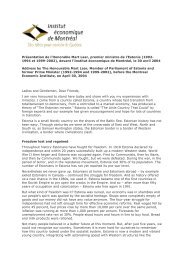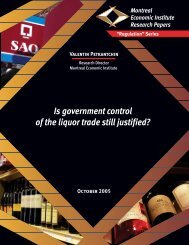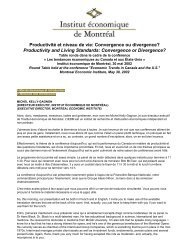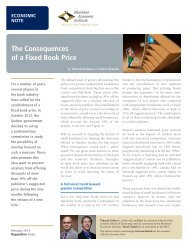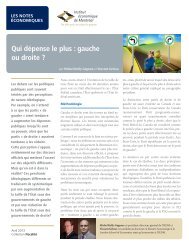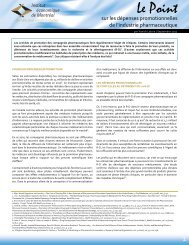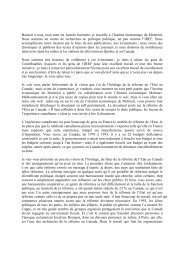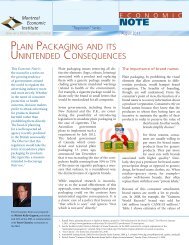Publication (PDF format) - Institut économique de Montréal
Publication (PDF format) - Institut économique de Montréal
Publication (PDF format) - Institut économique de Montréal
You also want an ePaper? Increase the reach of your titles
YUMPU automatically turns print PDFs into web optimized ePapers that Google loves.
Why New International Taxes for Development Are Inefficienteffect by falsifying price signals and distorting theallocation of resources. 77 So either SDR allocationsare small and do little to help <strong>de</strong>veloping countries;or else they are substantial and they are likely togenerate inflation. In any case, whether they aresterilized or not, new SDR allocations wouldrepresent a tax. The efficiency of this tax wouldprobably be poor.2.3 Administrative CostsSecondly, how do the main IFD taxes fare withregard to the administrative cost criterion? Theadministrative costs of a tax (collection, enforcement,and compliance) are virtually impossible tomeasure, if only because it is impossible to apportionthe overhead cost of the whole tax and enforcementsystem among specific taxes. Taxpayers’ compliancecosts are also difficult to measure. We canhowever make some qualitative points.,,The administrative costs ofa tax (collection, enforcement, andcompliance) are virtually impossibleto measure, if only because it isimpossible to apportion theoverhead cost of the whole taxand enforcement system amongspecific taxes. ,,At least for the French government, theadministrative costs of the airline tax appear to below, if only because it was simply an addition to anexisting civil aviation tax. However, it is worth notingthat the French auditor ad<strong>de</strong>d that “a tax created exnihilo would have been much more costly, whichmay explain why many countries hesitate to adoptsuch a tax.” 78 According to the French government,the compliance cost for the airlines is “marginal.”One large airline evaluates its administration costat 0.5% of the tax collected, 79 but the proportionis probably larger for smaller airlines. Hence our77. Lemieux (2013), pp. 133-135 and 140-141.78. Cour <strong>de</strong>s comptes (2010), p. 6.79. Ibid., p. 7.evaluation of the administrative cost of this tax as“low to average” in Chart 4.The administrative costs of an FTT <strong>de</strong>pendlargely on which financial instruments it wouldapply to. The extreme case would be if, in or<strong>de</strong>r tominimize distortions, it were applied to all financialtransactions, including <strong>de</strong>rivatives and foreignexchange transactions. The complexity of financialtransactions and the diversity of intermediariesraise administrative and enforcement challenges.A study by the IMF’s John Brondolo pru<strong>de</strong>ntlyconclu<strong>de</strong>d that FTTs were administratively feasiblebut required “a targeted enforcement programbacked by an appropriate penalty regime.” 80 In lightof Brondolo’s assessment, it is reasonable to rate theadministrative costs of FTTs as between averageand high.Carbon taxes would likely carry higheradministrative costs than FTTs, especially if theydid not take the form of a well-oiled and i<strong>de</strong>al capand-tra<strong>de</strong>system. An IMF study documents thatcarbon taxes are expensive to establish and, often,to collect. 81 This is especially true of excise taxes onmaritime shipping, as ships have a wi<strong>de</strong> choice ofwhere to buy their fuel. Moreover, any carbon tax onshipping would impose costs on tourism and otherexports (as well as imports) of <strong>de</strong>veloping countries.In or<strong>de</strong>r to counter these costs, the IMF proposescomplex transfers to the governments of harmedcountries, which would greatly complicate analready complex tax and increase its administrativecosts. Consequently, we are conservative in sayingthat the administrative costs of such taxes would beaverage to high even if the IMF itself does not seem<strong>de</strong>terred by the problems it points out.Although, to our knowledge, no estimate existsfor the cost of collecting and enforcing currenttobacco taxes, it is probably quite high given thecontinuous encroachment of black markets insmuggled and counterfeit tobacco products. Anadditional IFD levy on top of current taxes wouldprobably see the cost of enforcement rise sharply atleast in <strong>de</strong>veloped countries (and all this for littleincrease in revenue, if any).80. Brondolo (2011), p. 45.81. IMF (2011).Montreal Economic <strong>Institut</strong>e 23



